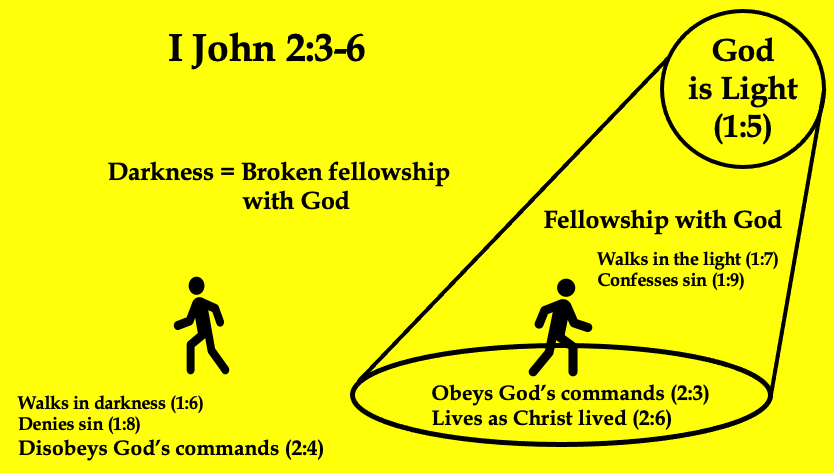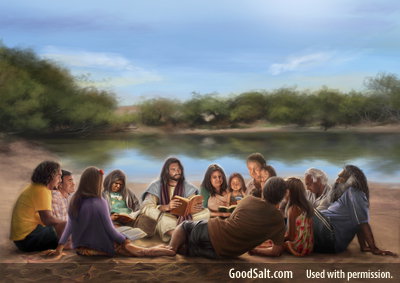“Now by this we know that we know Him, if we keep His commandments.” I John 2:3
Anderson writes, “Author and marriage counselor Gary Chapman has suggested that husbands and wives have five general ways in which they perceive love from their partner:
1. Words of Affection
2. Quality Time
3. Receiving Gifts
4. Acts of Service
5. Physical Touch
“Usually one of these ‘love languages’ is primary for a husband or wife. Unfortunately, mates usually don’t have the same ‘love language.’ Like a Russian who speaks only Russian being married to a Chinese person who speaks only Chinese, a husband might be saying ‘I love you’ in his language, but his wife does not get the message because she has a different love language. According to Chapman, marital intimacy is difficult to achieve unless each partner learns to speak the ‘love language’ of his/her mate.” 2
Christians may assume that God’s primary love language is the same as theirs, so they try to express their love to the Lord in a way that is meaningful to them but not as meaningful to God. While it is true that there are many ways to show God we love Him, what if the Lord has a primary love language and we fail to address it? Is it possible we will not be as close to God because we have not learned His primary love language? 3 I think the apostle John would answer this question in the affirmative. Beginning in I John 2:3, John introduces God’s primary love language.
In verses 1:5-2:2, the apostle John referred to fellowship with God as “walking in the light,” that is, being open and responsive to what the Lord reveals to him or her. A Christian can be honest with God about what is revealed to him or her and enjoy fellowship or closeness with God because of the all-sufficient shed blood of Jesus Christ (1:7, 9; 2:1-2). Or believers can be dishonest with God and experience darkness or broken fellowship with Him (1:6, 8, 10).
Beginning in I John 2:3 John introduces the idea of “knowing God” as another term for fellowship with the Lord. It follows that fellowshipping with God in the light will lead to knowing Him more intimately. The more time a believer spends with God in the light, the more he or she will know Him. John writes, “Now by this we know that we know Him, if we keep His commandments.” (I John 2:3).
We have already mentioned in previous articles that some Bible interpreters see I John as tests for eternal life or knowing you are going to heaven 4 while others see it as tests for fellowship or closeness with God on earth. 5 Those who understand I John to provide tests for eternal life understand I John 2:3 to teach that you can tell if you know Christ as your Savior by keeping God’s commandments. According to this view if you want to have assurance that you are a genuine Christian and will go to heaven, then you must keep or obey God’s commandments. Hence, if you are not obeying God’s commandments, you are not a genuine believer in Jesus and you will go to hell when you die. This understanding emphasizes that salvation is by faith, but you cannot know for sure if your faith is real unless you keep God’s commandments. But this understanding is contrary to John’s writings: 6
1. John clearly teaches that a person is saved by believing in Christ alone for eternal life (John 3:15-18, 36; 4:10-14; 5:24; 6:35-40, 47; 7:37-39; 11:25-26; 20:31; cf. I John 5:1b, 13; et al.). He never mentions obeying God’s commands as a condition for salvation in his gospel which was written to tell non-Christians how to obtain eternal life (John 20:31).
2. The notion that a person can believe in Christ for eternal life without knowing for certain he or she has truly believed in Him is foreign to John’s writings. For example, when Jesus asks Martha if she believes He is the Resurrection and the Life Who guarantees a future resurrection and never-ending life to all who believe in Him (John 11:25-26), she replies, “Yes, Lord, I believe that You are the Christ, the Son of God, who is to come into the world.” (John 11:27). Martha did not say, “I think I believe…” nor does she say, “Maybe I believe…” She said, “Yes, Lord, I believe…” Martha was convinced that Jesus was the Christ – the One who guarantees a future resurrection and never-ending life to all who believe in Him. Could Martha believe that Jesus was the Christ without realizing she herself had eternal life? No. To believe that Jesus was the Christ was to believe His guarantee of eternal life. To doubt His guarantee of eternal life was to disbelieve Jesus was the Christ. Christ accepts Martha’s response. He does not tell her to wait and see if her faith is real by keeping His commandments. Since belief in Christ is a conviction that He is speaking the truth and is therefore worthy of one’s trust, 7 we can know we have believed.
Many people today make a distinction between head faith and heart faith. They have told us that we can miss heaven by eighteen inches because we have believed in Jesus with our head but not with our heart. But where does the Bible make this distinction? It does not. Nowhere in the Bible does God distinguish head belief from heart belief. All belief is belief. If we believe in Christ for eternal life, then we know we have eternal life because Jesus guarantees, “He who believes in Me has everlasting life.” (John 6:47).
To doubt that we “truly believe” is to disbelieve Jesus’ promise. Either I believe Christ’s promise, or I do not. If I do, I have eternal life. If I do not, I stand condemned as one who “has not believed in the name of the only begotten Son of God” (John 3:18). The gospel of John does not condition eternal life on whether one has “heart belief” instead of “head belief.” Saving faith is the conviction that Christ died for my sins and rose from the dead, and then believing or trusting in Him alone for His free gift of eternal life. What makes saving faith saving is not the amount or uniqueness of the faith, but Whom your faith is in and What your faith believes. Saving faith results instantly in eternal salvation because it believes in the right object: the promise of eternal life to every believer by Jesus Christ Who died for our sins and rose from the dead (John 3:15-18; 6:40, 47; I Corinthians 15:1-8; et al). Therefore, those who refer to “head belief” or “heart belief” are reading into the word “believe” as the Bible neither does, nor provides basis for doing. 8
When Martha answered Jesus’ question with, “Yes, Lord, I believe that You are the Christ, the Son of God, who is to come into the world” (John 11:27), neither she nor Jesus analyzes her faith to distinguish head faith from heart faith. Martha confidently affirms that Jesus is “the Christ, the Son of God, Who is to come into the world.” What Martha believes about Jesus is exactly what John says in his purpose statement is all that a person must believe to have everlasting life (John 20:31). She knows she has believed in Christ, the Son of God, and therefore she is certain she has eternal life.
Does Jesus correct Martha’s response? Does He caution her to wait and see if her faith is real (as so many do today) through the manifestation of good works or fruit first before making such a statement? Does He ask her if she believes in her “heart” and not merely in her “head”? He does not because if any sinner comes to believe that Jesus is “the resurrection and the life,” that is, “the Christ, the Son of God,” he or she knows they have everlasting life.
Let’s get back to I John 2:3. Again the apostle John includes himself, the other apostles, and his Christian readers (2:12-14; 5:13) when he uses the word “we.” To say that “we” cannot refer to genuine Christians ignores the entire context and denies the obvious meaning of the text (cf. 1:1-2:1). 9
The Greek word for “know” (ginōskō) occurs twice in this verse. Anderson makes a very important observation concerning the different tenses of this same verb, “The first use of ‘know’ is in the present tense (ginōskamen); but the second use of ‘know’ is in the prefect tense (egnōkamen). If we miss this deliberate shift on John’s part, we miss his intent for the verse. Others have pointed out that this root word for ‘know’ (ginōskō) speaks of ‘experiential’ knowledge as opposed to intuitive knowledge. It is what is called by Greek grammarians a ‘stative’ verb because it refers to a state of being as opposed to a verb of action. In other words, to ‘know’ or to ‘believe’ speak of inner truths but not outward actions.
“Now a Greek grammarian named McKay has written an excellent article dealing with the perfect tense of stative verbs in which he demonstrates that putting a stative verb in the perfect tense has the effect of intensifying the basic meaning of the verb. It’s a deeper state of whatever the meaning of the verb is. In this case, the verb means ‘to know’ in the sense of an experience. So, putting it into the perfect tense means ‘to know intensely,’ ‘to experience deeply,’ or ‘to know fully.’ It’s much like the OT meaning when it says, ‘Adam knew his wife Eve, and she conceived and bore Cain…’ It’s an intimate knowledge.” 10
None of the commentators who think I John was written to provide tests for eternal life observe this significant change in the verb tenses of I John 2:3 because that would not support their conclusions. Instead of letting the text speak for itself, they read their own presuppositions into the text.
Anderson writes, “The perfect tense in the Greek language has the basic meaning of ‘completed action in the past with present results.’ But according to its use in context, a typical verb can put its emphasis on the completed action in the past or on the present results… But in a stative verb McKay’s point is that it should always be translated with the emphasis on the present results. In other words, ‘have come to know’ [NASB translation] does not recognize the significance of a stative verb in the perfect tense. A more accurate reflection of the emphasis on the intensified state of experiential knowledge here would be, ‘And by this we know that we know Him intensely.’ And what is intense knowledge if not deep, intimate knowledge?” 11
John is not testing to see if his readers have eternal life in I John 2:3. He is writing to test whether a person is having close fellowship with God. He is saying, “By this we know that we know Him intimately if we keep His commandments.”
The phrase “know Him” is more than knowing we are saved and have eternal life. It is knowing Christ intimately in a fellowship sense. While it is true that all Christians know Christ for salvation (John 10:14; 17:3), not all Christians know Christ in depth as a result of spending time with Him.
For example, an infant knows his parents in terms of being able to recognize them, but a teenager of the same parents knows them more in depth. Through shared time and experience, the teenager has become more intimately acquainted with his parents, whereas the infant has not.
In John 14:7-9, we see an example of a believer not knowing Jesus to a certain degree. Philip has just asked the Lord Jesus to show them the Father (14:8) and Jesus rebukes His ignorance, “Have I been with you so long, and yet you have not known Me, Philip? He who has seen Me has seen the Father; so how can you say, ‘Show us the Father’?” (John 14:9). Philip did know Christ in one sense. He was a saved man and possessed eternal life (cf. John 1:43-50; 2:11). Yet he did not know Christ in a deeper sense. He didn’t know how perfectly Jesus reflected the Father.
Continuing in John 14:15 Jesus says, “If you love Me, keep My commandments.” Jesus makes it clear that His primary love language is keeping His commandments. The way we show Christ we love Him is to “keep” or obey His commandments. But there is more.
Jesus says, “He who has My commandments and keeps them, it is he who loves Me. And he who loves Me will be loved by My Father, and I will love him and manifest Myself to him.” (John 14:21). To “have” Jesus’ commandments, we must spend time with Him to be aware of what He has said. When a believer “keeps” or obeys the Lord’s commandments, God the Father and God the Son will “love” him or her more intimately and Jesus will “manifest”or reveal more of Himself to them. The word “manifest” (emphanisō) means “to make visible.” 12 Christ reveals more of Himself to us, including His love, as we show him our love for Him by obeying His commandments.
God’s love is not static or unchanging. It is a growing experience in our relationship with the Lord. “God so loved the world” (John 3:16), but He also loves the obedient believer in a special sense (14:21, 23; cf. 13:23). God rewards obedience with a special experience of His love. Hence, when a believer obeys, Christ will reveal more of Himself to him or her leading to a deeper intimacy with the Father and the Son.
Isn’t this much like a love relationship with another person!?! We don’t usually tell someone everything about ourselves the first time we meet him or her. We share a little of ourselves and wait to see if the other person reciprocates by revealing some of their feelings for us. If he or she does, then we share a little more about ourselves. As we share a little more of ourselves with the other, our feelings for them intensify. Through shared time and experience the other person opens up to the other in a more intimate way.
The same is true of a Christian’s relationship with Christ. Christ will not reveal more of Himself to a believer unless that believer expresses his or her love for Him using His primary love language (keeping His commandments). When Christ sees us expressing our love for Him in this way, He has more confidence that we are ready for Him to share more of Himself with us. So, He reveals more of His love for us.
Verse 3 is telling us how we can know that we know Christ more intimately. If we are growing in our obedience to Christ’s commands, then we can know we are growing closer to Him. But what if a Christian says he knows Christ more intimately while living in disobedience to Jesus’ commandments? John tells us, “He who says, ‘I know Him,’ and does not keep His commandments, is a liar, and the truth is not in him.” (I John 2:4). Interestingly the word “know” (egnōka) is in the perfect tense, so it could be translated, “He who says, ‘I know Him intimately…’” 13
John explains that a believer in Jesus who claims to know Christ more intimately while living in disobedience to His commands “is a liar, and the truth is not in him.” The reason he “is a liar” is because you cannot know Christ more intimately while disobeying His commandments. Such a claim is false. When a believer is living in disobedience, “the truth” of God’s Word is not dynamically active “in” him. The truth has lost its hold on his heart. When “the truth is… in” a Christian in a controlling way, however, such self-deception is not possible. “On the contrary, the most godly saints throughout church history have also been those most deeply aware of their own sinfulness…”
“The truth is either in me as a Christian or it is not. If it is, then I will be engaged in active obedience to God’s commands. If it is not, I am sadly out of touch with the transforming power of the truth of God.
“Thus, it is altogether appropriate for each of us as born-again believers to ask ourselves: ‘Is the truth really in me? Is it working dynamically in my heart and life?’ On the answer to questions like these depends the reality of our communion with our living Lord.” 14
What happens in relation to God’s love when a Christian keeps His commandments? “But whoever keeps His word, truly the love of God is perfected in him. By this we know that we are in Him.” (I John 2:5). In contrast (“But”) to the dishonest claim of verse 4, John now observes that obedience to God’s commands (“whoever keeps His Word”) results in “the love of God” being “perfected in him.” Love for God and obedience to His Word are not tests for eternal life as some often claim. Instead, they are tests for genuine fellowship or intimacy with God. 15
Keeping God’s Word is not a sign you are saved; it is a sign that you love God. This is taken right out of the Upper Room Discourse where Christ’s believing disciples are informed that their Teacher (Jesus) is going to be leaving them (John 13-17). What is their response to this news? “Don’t You care about us? Don’t You love us?” They are not questioning if they will go to heaven when they die. Their hearts are troubled by this news, so Jesus says to them, “Let not your heart be troubled…” (John 14:1). 16
The word “keeps” (tērō) means much more than “has” or possessing God’s Word (I John 2:5). John 14:21 states, “He who has My commandments and keeps them, it is he who loves Me. And he who loves Me will be loved by My Father, and I will love him and manifest Myself to him.” Loving God is more than having His commands. It is keeping His commands. This is more than obeying God’s commandments. It has the basic idea of “watching over, guarding, and protecting,” 17 much like a shepherd watches over his sheep, or a banker protects and guards his treasure, or a fiancé’ his bride-to-be. 18
Anderson illustrates this with a church member’s experience. “In a trip to visit her parents in Quincy, Illinois, she was looking out the front window and saw a baby bird which had fallen to the ground. The mother bird was coming down to feed it. She would feed the birds still in the nest high above the ground, but then she would swoop down to feed the baby bird on the ground. This went on day after day. Finally, Carol observed that the mother bird was building a protective tent over her baby bird so people passing by wouldn’t notice it. Her ritual was to feed the little birds above and then fly to the ground and stay a few feet from the ’tent’ to watch for predators she might have to ward off should they get near her hidden, baby bird. She was protecting, she was guarding, and she was keeping her little one safe.
“That’s what ‘keeps’ means here. It’s more than just to have a Bible or several of them in your house. It’s to treasure God’s Word, to guard it, to protect it. It’s to realize that many people in this world don’t have this book, have never had a chance to listen to its promises or read it for themselves. Outside of our personal relationship with Jesus, His Word may be the most precious thing we have from Him. The person who ‘keeps’ His Word is the one who has His Word, guards His Word, and cherishes His Word. In this person the love of God is perfected.” 19
John tells us that the Christian who keeps God’s Word in this way “truly” has “the love of God… perfected in him” (2:5). The Greek verb “perfected” (teleioō) is in the perfect tense (teteleiōtai) and means “to bring to completion, to bring to its goal, or to bring to full measure…” 20 While God’s love is incredible to the believer at the moment of salvation (John 3:16; Romans 5:8), it’s goal is not reached until the Christian returns that love by his or her obedience, resulting in a greater understanding and experience of the deeply personal love of the Father and Son as they “make [their] home with him” (John 14:23). 21
When a believer cherishes and obeys God’s Word, he or she becomes more intimately acquainted with God’s love. Since God is love (I John 4:8b), to know God intimately is to know His love more intimately. 22
Anderson suggests that this is a reciprocal experience of God’s love. “John says what is in a state of completeness here is the ‘love of God.’ This could mean our love for God or God’s love for us. We would suppose it means our love for God since this is God’s primary love language, that is, the main way He says we can show that we love Him. But we can’t rule out His love for us here since He promises in John 14:21 to love us back if we demonstrate our love for Him by keeping His commandments. Reciprocal love—our love for Him and His love for us. Love is most complete when it is reciprocated. If it is all one-sided, it is still imperfect and incomplete.” 23
When John writes, “By this we know that we are in Him” (2:5b), he is not referring to the apostle Paul’s concept of being “in Him” (Christ) which describes the permanent position of all Christians. John uses the phrase “in Him” like Jesus did in the Upper Room Discourse (John 13-17), to describe, not all Christians, but the group of believers who “abide” in Christ (John 15:1-8). Abiding in Christ is another term that John uses to describe fellowship with Jesus. 24 Jesus said, “By this My Father is glorified, that you bear much fruit; so, you will be My disciples.” (John 15:8). It is very important to observe that Jesus does not say fruit bearing is necessary for salvation. He says it is necessary to be His “disciples.”
Abiding in Christ is a discipleship experience, not a salvation experience for John. “In I John 2:5-6, discipleship is also in view, as is seen from the reference to the imitation of Christ in verse 6… In short, 2:5-6 continues to talk about the believer’s fellowship with God.” 25
“He who says he abides in Him ought himself also to walk just as He walked.” (I John 2:6). For the first time in his epistle, John uses the phrase “abides in Him” as another way of describing fellowship with God. The Greek word “abides” (menō)means “to remain, stay, dwell, continue” 26in fellowship. John uses this word twenty-four times in I John (2:6, 10, 14, 17, 19, 24 [3], 27 [2], 28; 3:6, 9, 14, 15, 17 24 [2]; 4:12, 13, 15, 16 [3]. The emphasis of I John is abiding in Christ so we may have close fellowship with Him. The believer who claims “he abides” or remains in Christ must live just as Jesus lived (“walk just as He walked”). He must live as Christ’s disciple.
In John 8:29, Jesus told His enemies, “And He who sent Me is with Me. The Father has not left Me alone, for I always do those things that please Him.” The proof that Christ’s claim to be God is true is that He “always” does “those things that please” His heavenly Father. If we claim to abide in Jesus, we are to seek to do the things that please God the Father. Christ taught that the goal of a disciple is to be like his Teacher (Matthew 10:24). If we claim to be Jesus’ disciple, we must live as our Teacher lived.
“When it comes to making tea, some people dip their teabags in and out of the hot water. Many Christians approach their relationship with Jesus like this—dipping in and out of church on Sunday mornings, with little change resulting. Other tea drinkers place their teabags in the water and let them remain. In time, the tea seeps into the water and transforms it. For Christ to influence and transform your life, you must remain in Him.” 27
Anderson illustrates I John 2:3-6 with this true story: 28 “Boris Kornfeld was a Jewish doctor living in Russia. He grew up with Stalin as his God. He was not a practicing or religious Jew. He did not believe in Yahweh of the OT. He believed in Lenin and Stalin and socialism. But one fourth of the people in the USSR were informants for the KGB. It was a terrorist state. Someone turned Boris in. For what he did not know.
“The KGB whisked him off to one of their prison camps. He was dumbfounded. He had not been unloyal to the state. Lenin and Stalin had been his gods. But there he was, a prisoner of the state. And as he sat in his prison camp and saw the senseless death and destruction, he threw off the shackles of socialism. He deposed the god he was worshipping. He said to himself, ‘This philosophy of life cannot be true.’
“Kornfeld listened to other prisoners who had put their hope in Jesus. For a Jew to give up socialism or communism was one thing, but for a Jew to embrace Jesus was another. But as he kept hearing about the peace and hope Jesus could bring, Boris decided to try Jesus as his Messiah. Not long after trusting Christ he was in a Bible study and listened to this passage, which gives God’s love language: ‘If you love me, keep my commandments.’ Boris Kornfeld knew he wasn’t keeping God’s commandments. On a regular basis he, as a doctor, would sign slips of paper saying a prisoner was fit to go back to work in the mines when he knew this particular prisoner was not fit at all. This is how the prison system thinned their ranks. They just sent an unhealthy person into hard labor. They rarely came out of the mines alive.
“Boris had signed hundreds of these slips, these death warrants. He thought, ‘I’m not going to sign any more slips.’ He knew he was somewhat protected because they needed doctors, but he really did not know what would happen to him.
“Soon after this decision he saw an orderly stealing bread. He could overlook it but decided the right thing to do would be to report it. The orderly was put into the stockade for three days, but when released Boris knew the orderly would be out to get even.
“He began sleeping in the hospital to avoid being caught in the darkness by this vengeful orderly. But he also sensed a new freedom he had not experienced before. He thought, ‘Being willing to die for Christ, being willing to be punished for Christ—all of a sudden, I had a freedom and a peace I had never known in my life. I sensed God was with me and I sensed that He loved me in a special way, and all of a sudden, I had to tell someone. I had never told anyone what had happened to me.’
“A young man came in who had cancer in his intestines. Boris operated on him, and as the young man was coming out of the anesthesia, Boris said to himself, ‘I’ve got to tell this fellow.’ So as the young man was coming out of anesthesia and still in a stupor, Boris began to tell his story of peace and of love and of forgiveness of sins through Jesus Christ. The young man missed most of the beginning of Boris’s story because of the drugs lingering in his system, but then he began to understand, and Boris just couldn’t stop talking. He went on talking for an entire day.
“That night the orderly found Boris and hit him on the head six times with a plasterer’s mallet killing him. But the message Boris shared never left the heart of the young man who heard it, the only man who ever heard Boris’s message. This message of good news, peace, and forgiveness burned in his soul until he too trusted in Jesus Christ as his Savior. Ultimately, this young man cured of physical cancer and the cancer of sin was released from that prison. He went out and told the world the story of the Gutlag Archipelago. His name? Nobel Prize winner Alexander Solzhenitsyn.” 29
“If you love Me, keep My commandments.” (John 14:15).
Prayer: Lord Jesus, thank You for revealing to us that Your primary love language is keeping Your commandments. We cannot claim to know You more intimately if we are not obeying Your commands. While Your love for us is remarkable the moment we believe in You for eternal life (John 3:16; Romans 5:8), its goal is not reached until we return that love by our obedience, resulting in a greater understanding and experience of the deeply intimate love of the Father and Son as they make their home with us. Teach us to live as You lived Lord Jesus – in willing submission to the Father and total dependence upon Him, always seeking to do what pleases Him. In Your mighty name we pray, Lord Jesus. Amen.
ENDNOTES:
1. David R. Anderson, Maximum Joy: I John – Relationship or Fellowship? (Grace Theology Press, 2013 Kindle Edition), pg. 71 cites Gary Chapman, The Five Love Languages (Chicago: Northfield Publishing, 1992).
2. Anderson, pg. 71.
3. Ibid.
4. Anderson, pg. 15 cites John MacArthur, Jr., Saved without a Doubt (Colorado Springs: Cook Communications, 1992), pp. 67-91; Constable, pg. 46 cites James Montgomery Boice, The Epistles of John (Grand Rapids: Zondervan Publishing House, 1979); Raymond Brown, The Epistles of John, Anchor Bible series(Garden City, N.Y.: Doubleday, 1982); F.F. Bruce, The Epistles of John (London: Pickering & Inglis Ltd., 1970; reprint ed., Grand Rapids: Wm. B. Eerdmans Publishing Co., 1986); John Calvin, The First Epistle of John, Calvin’s New Testament Commentaries series, Translated by T. H. L. Parker. Reprint ed. (Grand Rapids: Wm. B. Eerdmans Publishing Co., 1959-61); John F. MacArthur Jr., The Gospel according to Jesus (Grand Rapids: Zondervan Publishing House, 1988); John R. W. Stott, Basic Introduction to the New Testament, 1st American ed. (Grand Rapids: Wm. B. Eerdmans Publishing Co., 1964); Brooke Foss Westcott, The Epistles of St. John (1883. Reprint ed. England: Marcham Manor Press, 1966); and Warren W. Wiersbe, The Bible Exposition Commentary, 2 vols. (Wheaton: Scripture Press Publications, Victor Books, 1989).
5. Tom Constable, Notes on I John, 2022 Edition, pg. 7; David R. Anderson, Maximum Joy: I John – Relationship or Fellowship? (Grace Theology Press, 2013 Kindle Edition), pg. 28; Zane C. Hodges, The Bible Knowledge Commentary Epistles and Prophecy, Editors John F. Walvoord and Roy B. Zuck (David C. Cook, 2018 Kindle Edition), Kindle Locations 3367 to 3473; Zane C. Hodges; Robert Wilkin; J. Bond; Gary Derickson; Brad Doskocil; Dwight Hunt; Shawn Leach; The Grace New Testament Commentary: Revised Edition (Grace Evangelical Society, Kindle Edition, 2019), pg. 589; Tony Evans, CSB Bibles by Holman, The Tony Evans Bible Commentary (B & H Publishing Group, Kindle Edition, 2019), pp. 2329-2333; Constable, pg. 47 cites other commentators who hold that 1 John offers tests of fellowship rather than tests of life, including J. Dwight Pentecost, The Joy of Fellowship (Grand Rapids: Zondervan Publishing House, 1977); Joseph C. Dillow, The Reign of the Servant Kings (Miami Springs, Fla.: Schoettle Publishing Co., 1992), pp. 156-175; Guy H. King, The Fellowship (London: Marshall, Morgan & Scott, 1954); Charles C. Ryrie, Biblical Theology of the New Testament (Chicago: Moody Press, 1959), idem, “The First Epistle of John,”In The Wycliffe Bible Commentary, Edited by Charles F. Pfeiffer and Everett F. Harrison (Chicago: Moody Press, 1962), pg. 1466; J. W. Roberts, The Letters of John, Living Word Commentary series (Austin, Tex.: R. B. Sweet, 1968); and Karl Braune, The Epistles General of John, in John Peter Lange ed. Commentary on the Holy Scripture, Vol. 12, Reprint ed. (Grand Rapids: Zondervan Publishing House, 1960), pg. 15.
6. Adapted from Hodges, The Grace New Testament Commentary, pg. 590.
7. To “believe in” (pisteuōn eis) Jesus means to be persuaded that He is speaking the truth and is therefore worthy of your trust. See Walter Bauer, A Greek-English Lexicon of the New Testament and Other Early Christian Literature: Third Edition (BDAG) revised and edited by Frederick William Danker (Chicago: University of Chicago Press, 2000 Kindle Edition), pg. 816.
8. See discussion in Jeff Ropp, The Greatest Need in Evangelism Today is One Word: BELIEVE (Jeff Ropp, 2013), pp. 31-33.
9. Zane C. Hodges’ Grace Evangelical Society article on July 13, 2016, “Is God’s Truth in You? I John 2:4b,” at www.faithalone.org.
10. Anderson, pg. 74; cf. K. L. McKay, “On the Perfect and Other Aspects in the New Testament Greek,” Novum Testamentum, Vol. 23, Fasc. 4 (Brill: 1981), pp. 289-329.
11. Ibid., pp. 74-75.
12. Bauer, pg. 325.
13. Anderson, pp. 78-79.
14. Hodges, “Is God’s Truth in You? I John 2:4b.”
15. Hodges, The Grace New Testament Commentary, pg. 591.
16. Anderson, pg. 79.
17. Bauer, pg. 1002.
18. Anderson, pg. 80.
19. Ibid., pp. 80-81.
20. Bauer, pg. 996.
21. Hodges, The Grace New Testament Commentary, pg. 591.
22. Hodges, The Bible Knowledge Commentary Epistles and Prophecy, Kindle Location 3614 to 3618.
23. Anderson, pg. 81.
24. Constable, pg. 38; cf. Hodges, The Bible Knowledge Commentary Epistles and Prophecy, Kindle Location 3618 to 3630; Dillow, pp. 488-489; 612-626.
25. Hodges, The Bible Knowledge Commentary Epistles and Prophecy, Kindle Location 3622 to 3630.
26. Bauer, pp. 630-631.
27. Evans, pg. 1720.
28. Anderson, pg. 81 cites Chuck W. Colson, Loving God (New York: Harper Collins Publishers, 1983), pp. 19-25. 29. Ibid., pp. 81-84.










